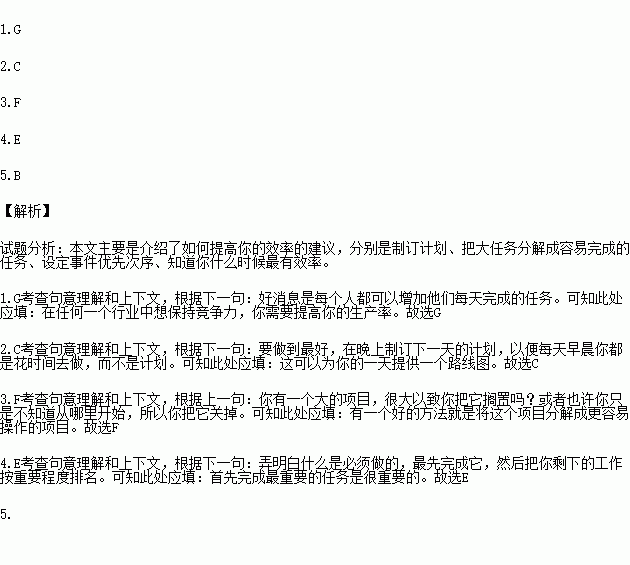题目内容
根据短文内容,从短文后的选项中选出能填入空白处的最佳选项。选项中有两项为多余选项。
Tips to Increase Your Productivity
Want to get more done in your day? Of course you do. 1. The good news is that everyone can increase the amount of tasks they accomplish in a day. Here are some tips to help you have a more productive day.
Make a plan for your day. Make sure you know how you want your day to go in advance, even before you start. 2. To work best, create the next day’s plan the night before so that every morning you spend time performing, not planning.
Break large tasks down into bits accomplished easily. Do you have a large project that’s just so big that you keep putting it off? Or maybe you’re just unsure of where to begin, so you put it off. 3. Therefore, you will feel a sense of accomplishment as you check the items of your list.
Always set your priorities (优先事项). 4. Figure out what must be done, do that first and rank the rest of your work according to importance. If you don’t get to the items at the end of your list, it won’t be a big problem, and you can do them another time.
5. If you are the most productive in the morning, that’s when you should hit it hard and do as much as you can. If you work better in the afternoon, take care of some things like emails in the morning and then accomplish the important projects in the afternoon. Keep on top of your work habits, and you’ll be more productive.
A. Reward yourself if you are productive.
B. Be aware of when you are the most productive.
C. This can provide you a roadmap for the day.
D. It’s tough to meet depressed people who are productive.
E. It’s important to accomplish the most important tasks first.
F. A good way is to break the project down into more manageable ones.
G. To stay competitive in any industry, you need to improve your productivity.
 世纪百通主体课堂小学课时同步达标系列答案
世纪百通主体课堂小学课时同步达标系列答案 世纪百通优练测系列答案
世纪百通优练测系列答案 百分学生作业本题练王系列答案
百分学生作业本题练王系列答案




